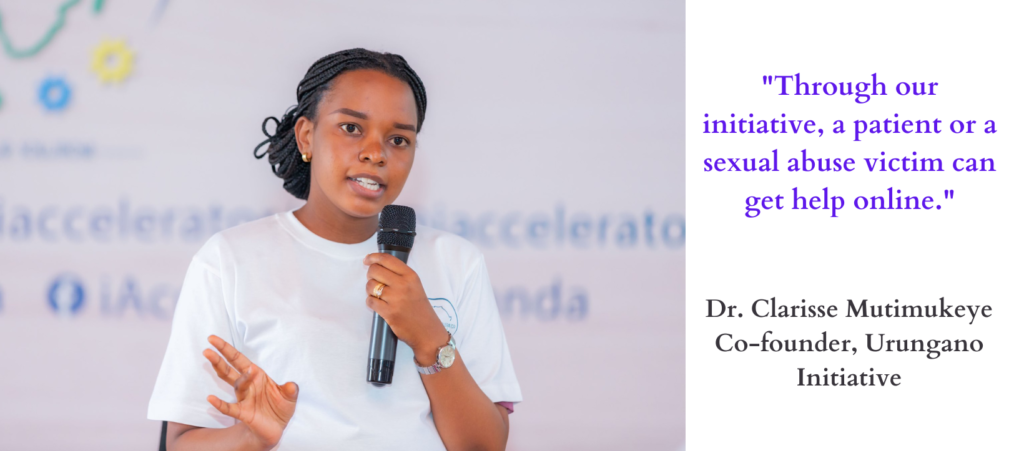
Dr Clarisse Mutimukeye is a medical doctor and the co-founder of Urungano Initiative in Rwanda. She was awarded the Marc Mitchell Leadership and Innovation Award at the 2022 Global Digital Health Forum. We interviewed her to learn more about her work.
Tell us about Urungano Initiative
I founded my organization, Urungano Initiative in Rwanda when I was a medical student. During clinical rotations, I noticed how young people were experiencing preventable sexual and reproductive health challenges because of inadequate reliable information. I decided to take the lead by using my medical skills to increase awareness of sexual reproductive health through accurate and reliable information and services. I planned and implemented different projects. I work with a dedicated team who are passionate about the wellbeing of young people.
We use an online clinic and pharmacy to extend services to young people across Rwanda. Young people can access the clinic and pharmacy via our website and an Android application. Young people are given the opportunity to consult medical doctors for any sexual and reproductive health and rights challenges. After the consultation, we ensure that they get access to basic information and skills on infection, reproductive health, and rights based on the challenge they are experiencing. Through our online pharmacy, other things are provided with emergency and basic drugs and products, including emergency contraception, condoms, sanitary pads. We also provide online teaching sessions through our tutorials and videos on our YouTube channel. We publish sexual reproductive health and rights-related articles on our website, and we conduct mentorships in different schools, health centers, and communities with the purpose of increasing awareness of sexual and reproductive health and rights.
Although there are many young people using digital technologies to access health information, most of this information is not reliable. For a developing country like Rwanda to have an online clinic where one can get consultation or medication through an online pharmacy is unique because it complements the face-to-face activities we convene in communities. Through our initiative, a patient or a sexual abuse victim can get help online, not just reaching out physically to a clinic. Our solution addresses the problem of social stigma and unreliable information.
What is your reflection about being part of the broader digital health community?
Being a member of the Global Digital Health Network has enabled me to remain on top of the latest trends through the resources that members share. By comparing and contrasting, what works, I have been able to adopt some best practices in my initiative. To ensure that our activities are in line with government priorities and that they are sustainable, we work closely with the Ministry of Youth and the Ministry of Health.
There is a lot to do to ensure that young people have access to health services and information. I find that it is important to involve young people in designing, implementing, and evaluating health services. For example, young people know exactly what problems they are experiencing and can be valuable in providing solutions. Young people can also support government initiatives and encourage fellow youth to access information to access treatment.
I am glad to have been selected for the Marc Mitchell Award. I am eager to share the lessons from our digital health approaches with the wider community funders, and policymakers at the 2023 Global Digital Health Forum. I hope that the mentorship will enable me to improve my skills in managing digital health initiatives from digital health experts from across the world.
In the next five years I hope that our organisation will be among the top organizations improving sexual reproductive health and rights, especially reducing early and unintended pregnancies in Rwanda. We also hope that we can broaden our reach to other East African countries.
About the Marc Mitchell Award
In 2019, the Global Digital Health Network announced the launch of the Marc Mitchell Leadership and Innovation award, recognizing exceptional individuals early in their digital health career who have demonstrated a commitment to making quality care accessible in all settings, especially in low- and middle-income countries, through the use of digital health. The Global Digital Health Network chose to honor Marc’s memory with the 2021 annual award to inspire and nurture health professionals whose resolve and creative ideas using digital technology are improving delivery of quality health care.
Dr. Marc Mitchell was the founder of D-tree International and a pioneer in the field of digital health, focused on improving the quality of healthcare and health systems through the use of digital technologies. One of the main challenges Marc worked to address was the development of electronic clinical decision support systems to replace traditional, bulky, expensive and largely unused paper-based algorithms. At a time when apps were just emerging, Dr. Mitchell saw the potential for digital technology on mobile devices to both provide step-by-step guidance to frontline health workers as they met with clients and integrate that care into a comprehensive health care system. These tools led to improved clinical protocol adherence and better health outcomes—and provided some of the earliest evidence showing the positive impact of adopting digital technologies in the health sector. Marc began his career in international health in the 1970s in Tanzania, where he worked as a paediatrician. He later served as Assistant Secretary of Health in Papua New Guinea, advised the Government of Indonesia in its family planning efforts, and consulted with WHO on its digital and mobile health programmes. Over the course of his career, he lived and worked in Tanzania, Indonesia, Papua New Guinea, Mexico, and Myanmar, and supported projects in over 40 countries. He was also on the faculty at Harvard School of Public Health and was dedicated to teaching and mentoring the next generation of public health leaders. Dr Mitchell’s work in digital health was guided by his passionate belief that all people everywhere should have access to high-quality health care.